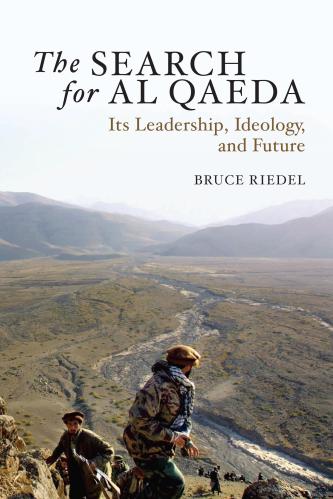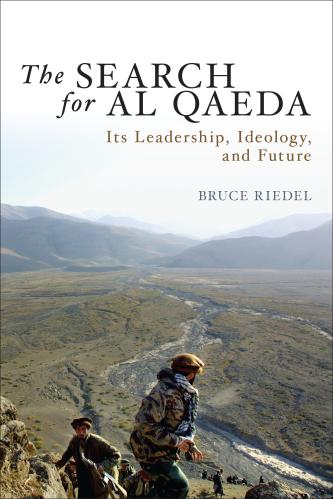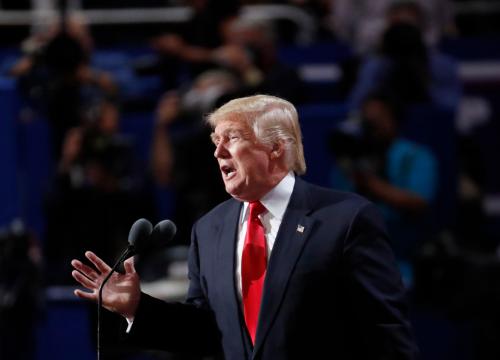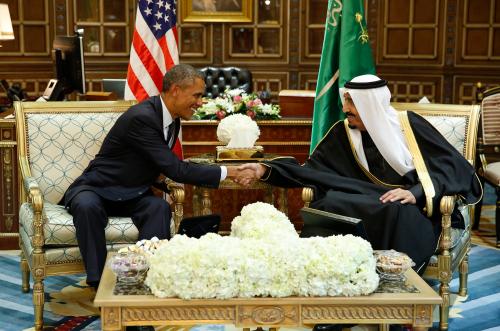The United States cooperates on a range of counterterrorism activities with many unsavory or incompetent partners, particularly in the developing world, as Daniel Byman (senior fellow in Brooking’s Center for Middle East Policy) argues in a new article. There have been increasingly public debates over U.S. support for many of these authoritarian governments—in Congress, Republicans and Democrats alike are questioning traditional security relationships with longstanding U.S. partners like Egypt, Pakistan, and Saudi Arabia. This is an understandable reaction to the difficulties and limitations of counterterrorism cooperation in the developing world.
Nevertheless, that cooperation remains critical, Byman contends. Despite the many practical and ethical challenges that come with some of these partnerships, the remarkable success of the U.S. counterterrorism campaign since 9/11 is a testament to the indispensable need for cooperation with the developing world.
Imperfect liaisons
The core criticism of U.S. counterterrorism cooperation with most developing world partners is the implicit support for generally corrupt, repressive governments and their powerful security services, Byman writes. While the debate over the causes of terrorism is beyond his article’s scope, the poor governance and limited economic opportunities endemic to much of the developing world correlates with greater instances of violence and terrorism. Effective counterterrorism operations, therefore, tend to take place where the terrorists actually are: those weak, corrupt, authoritarian states of the developing world.
The heart of counterterrorism is good intelligence, argues Byman, but that’s a resource-intensive commodity; it takes time and people to establish network and infiltrate organizations. Thus, the need for counterterrorism in the developing world is in large part simply a matter of practicality. The nature of terrorism in the modern, globalized world has added greater complexity to the inherently difficult task of identifying, tracking, and destroying small, secretive, and sometimes transnational organizations, he adds. U.S. intelligence agencies simply can’t maintain the necessary physical presence and human networks all over the world. By working with domestic intelligence, security, and police services, the United States can benefit from massive organizations already operating and embedded in local communities.
Byman writes that cooperation with local partners also enables U.S. intelligence agencies to overcome the additional challenges inherent to being foreigners (relatively less knowledge of local languages and customs, for example). Moreover, the jihadist movement is often concentrated in some of the most isolated and tribal areas in the world (North Africa, Yemen, Pakistan), and partnering with local security services allows a combining of efforts in an environment where duplicating them would be quite costly, if not infeasible.
Finally, when security services operate in their domestic environment, they have means and tools that are unavailable to a foreign intelligence service, Byman points out. The ability to leverage the full range of government power—whether the local police, tax collector, welfare office, or licensing board—provides a more flexible spectrum of coercion beyond anything available to U.S. intelligence agencies. Because partner countries are also often marred by weak rule of law and institutional corruption, local security services may face little to no constraints for surveilling, detaining, and coercing people (of course this also sometimes includes torture). Byman contends that U.S. counterterrorism resources can be more effectively used supporting and augmenting partner efforts. In many instances, partners provide the mass, in the form of manpower and presence, while the United State facilitates coordination and provides various sorts of assistance, whether technical expertise or simply money.
Common problems when partnering with pesky authoritarians
Without access to classified material, it is impossible to fully appreciate the impact of U.S. intelligence liaisons with developing world partners, Byman acknowledges. He argues that counterterrorism cooperation has undoubtedly been critical to successfully averting another large-scale terrorist attack in the United States since 9/11. However, there are important limitations and challenges when working with developing world governments.
Throughout much of the developing world, the security services are generally the most powerful and competent part of government, he writes, because they are responsible for regime survival. They might be effective counter-terrorists if and when terrorism is perceived to be a serious threat to the regime, but many security services can also be constrained by design—through creating redundant and competing organizations, or through politicization to ensure loyalty—in acts of coup-proofing. This complicates U.S. liaisons: politicized structures may not even be formalized, for instance, making an often byzantine system even more opaque.
Byman also describes how partner governments may incentivize loyalty through deliberate corruption. Cooperation is harder when corruption is institutionalized, whether by design or by accident: it not only undermines the professionalism of the security services, but can create a more permissive environment for terrorist organizations. Institutional corruption could allow adversaries to evade capture, infiltrate secure targets (including possibly U.S. bases and personnel locations), and purchase access to information, he writes. Of course, in cases like Pakistan, the U.S. partner outright supports some terrorist organizations, despite actively fighting others.
Some governments view terrorism as merely an inconvenience—or even a useful justification for power, argues Byman. In Russia and many other countries, for example, the government attempts to delegitimize political opponents by labeling them terrorists. Indeed, the scale of U.S. support for counterterrorism post-9/11 has proven to be enormously rewarding for many developing countries, who reap U.S. security assistance and international legitimacy. Byman points to the dilemma that this support sometimes dis-incentivizes countries from resolving terrorist threats because that risks losing American support.
Relationship advice: Set boundaries, manipulate through denial
While the value of these U.S. intelligence liaisons may seem questionable, Byman concludes that effective counterterrorism is impossible without local partners, and that the U.S. national security community needs to work to mitigate the worst of these problems. One of Byman’s primary recommendations is greater conditionality in our partnerships. Instead of attempting to bribe its way to improved partner competence or collaboration, the United States can better incentivize partners by limiting aid and thus forcing competition amongst partner services. The United States could also more effectively incorporate intelligence liaison with broader aid programs to mitigate partner fears of losing American support if terrorism recedes. Byman concludes that the United States must continue counterterrorism cooperation in the developing world, but better understand the problems and limitations inherent to those partners.
The Brookings Institution is committed to quality, independence, and impact.
We are supported by a diverse array of funders. In line with our values and policies, each Brookings publication represents the sole views of its author(s).










Commentary
Necessary crooks and thugs: U.S. counterterrorism cooperation with the developing world
October 14, 2016